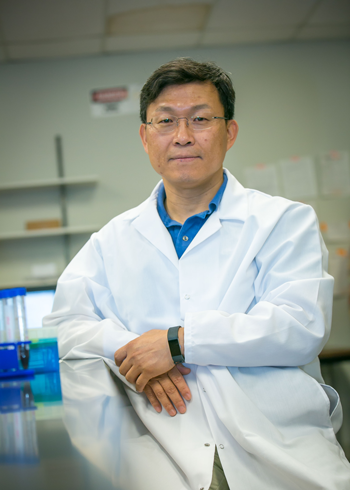A team of researchers led by Cleveland State University has received a $1.69 million grant from the National Institutes of Health to improve treatment of type-2 diabetes. The effort will use innovative human tissue modeling to better assess potential non-invasive therapies that could improve quality of life for patients.
“Type 2 diabetes (T2D) is a metabolic disease that involves the gastrointestinal (GI) tract, liver, and pancreas. It is associated with chronic inflammation, insulin resistance in the liver, and impaired glucose storage, which over time can be deadly,” notes Moo-Yeal Lee, associate professor of chemical and biomedical engineering at CSU and lead of the research team. “The most effective treatment today for T2D is gastric bypass surgery, is invasive, expensive and can cause numerous health complications. Non-surgical therapies have significant potential to reduce risks and improve overall quality of life for patients.”
Unfortunately, current efforts to study the interplay between the liver, pancreas and the GI tract, to develop drugs or hormone-based alternatives for T2D, have depended on animal models. These models can not replicate human physiology, while the inter-organ effects of hormone and nutrient changes in the human body are difficult to simulate in vivo.
In response, Dr. Lee’s team has developed robotic, high-precision, 3D bio-printing technology which allows for the generation of testable human tissues in a laboratory environment. The team will utilize liver, pancreas and intestine tissues derived from human stem cells to simulate the normal mechanisms involved in inter-organ “crosstalk” and investigate how hormones, nutrients and drugs might mediate the reversal of T2D. The work builds on a previous NIH R01 grant Dr. Lee received to develop the 3D bio-printing system. Other key investigators in this project include Drs. James Wells (PI) and Takanori Takebe (co-I) from Cincinnati Children's Hospital Medical Center and Dr. Eben Alsberg (co-I) from Case Western Reserve University.
“3D bio-printing is transforming how we test drugs and other therapies and providing never-before-available insights on how the human body actually works,” Dr. Lee adds. “This grant will further applications of the technology while helping us develop better treatments for a disease that affects millions around the world.”
Information gathered from this site.
For other articles on this topic, click here.

